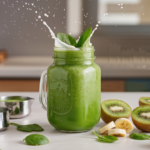If you’ve never heard of mamoncillo, or Spanish lime, you’re not alone. This tropical fruit, popular in parts of Central America, the Caribbean, and northern South America, is a hidden gem packed with nutrients, including a significant amount of B vitamins, making it a natural brain booster. Known for its tangy-sweet, jelly-like pulp encased in a thin green shell, mamoncillo is gaining attention not just for its refreshing taste but also for its impressive health benefits, especially for cognitive function. Let’s dive deep into why this underrated fruit deserves a spot in your diet.
What Is Mamoncillo (Spanish Lime)?
Mamoncillo, scientifically called Melicoccus bijugatus, is a small tropical fruit related to lychee and rambutan but distinct in flavor and nutritional profile. The fruit’s pulp surrounds a large slippery seed that should be consumed carefully to prevent choking. Beyond its delicious flavor, mamoncillo boasts an array of vitamins, minerals, and bioactive compounds, particularly B vitamins, iron, phosphorus, and antioxidants, all of which contribute to its brain-boosting and overall health-promoting properties
The B Vitamin Powerhouse for Brain Health
B vitamins, including B1 (thiamine), B2 (riboflavin), and B3 (niacin), are abundant in mamoncillo. These vitamins play crucial roles in energy metabolism, neurotransmitter synthesis, and brain function:
- Vitamin B1 (Thiamine): Essential for glucose metabolism in the brain, it supports memory and cognitive function.
- Vitamin B2 (Riboflavin): Helps in energy production and protects brain cells from oxidative damage.
- Vitamin B3 (Niacin): Vital for DNA repair and synthesis, it improves circulation and helps prevent brain aging.
Regular intake of B vitamins is linked to better mood regulation, memory support, and protection against age-related cognitive decline, making mamoncillo a natural ally for brain health.
Antioxidants and Anti-Inflammatory Compounds
Mamoncillo isn’t just about vitamins. It’s rich in antioxidants such as polyphenols, flavonoids, caffeic acid, and phenolic compounds. These bioactive substances help combat oxidative stress and inflammation, two major contributors to neurodegenerative diseases and cognitive decline.
In fact, studies have shown the phenolic compounds in mamoncillo may help lower blood pressure and reduce bad cholesterol (LDL), indirectly supporting brain health by improving overall cardiovascular circulation — critical for supplying oxygen and nutrients to the brain (). Additionally, these antioxidants protect brain cells from damage, helping maintain cognitive function over time.
Supporting Nutrients: Iron, Phosphorus, and Fiber
Mamoncillo is also a good source of iron and phosphorus, minerals vital for brain and body function. Iron is necessary for oxygen transport in the blood and plays a role in neurotransmitter production, affecting mood and cognitive performance. Phosphorus is a structural component of brain cells and is important in energy transfer (ATP) that drives biochemical reactions in the brain.
Its fiber content not only supports digestive health but also helps regulate blood sugar levels, preventing spikes and crashes that can affect concentration and brain energy.
Traditional and Emerging Health Benefits
Beyond brain function, mamoncillo is recognized for its wider health benefits:
- Immune Support: High vitamin C and antioxidant levels boost immune defenses, helping protect the brain from infections that might impair cognitive function.
- Asthma and Respiratory Relief: Compounds like caffeic acid found in mamoncillo pulp reduce airway inflammation, supporting better oxygen intake vital for brain function.
- Diabetes Prevention: Its tannin content helps regulate blood sugar, which is important because diabetes is a known risk factor for memory problems.
- Weight Management: Low in calories and fat but high in fiber, mamoncillo aids satiety and can support weight control, preventing obesity-related cognitive risks.
How to Enjoy Mamoncillo
Eating mamoncillo is simple: crack open the thin green shell and enjoy the jelly-like pulp surrounding the seed. The pulp has a tart-sweet flavor making it a refreshing snack or addition to fruit salads, smoothies, and desserts. However, care should be taken to avoid choking on the slippery seed, especially with children.
Availability and Where to Find Mamoncillo
Mamoncillo grows mainly in tropical climates and may be hard to find fresh in many supermarkets outside its native regions like Mexico, the Caribbean, and Central America. In the U.S., it’s mostly available in Florida or specialty markets, but can sometimes be ordered online seasonally. Growing it at home is possible in warm climates, but trees take several years to mature.
Safety and Precautions
Mamoncillo is generally safe when consumed in moderation. The fruit’s astringency can cause mild throat irritation if eaten excessively. Removing the seed before giving the fruit to children is important to prevent choking hazards. Unlike some related fruits, its seeds and pulp have no known toxic compounds, and roasting seeds may enhance safety and flavor.
Summary: Why Mamoncillo Deserves a Place in Your Brain-Boosting Diet
Mamoncillo, or Spanish lime, is a nutrient-dense tropical fruit packed with B vitamins, antioxidants, minerals, and fiber—all synergistically supporting brain health and cognitive function. Its rich supply of B1, B2, and B3 vitamins facilitates energy metabolism and neurotransmitter synthesis, while antioxidants combat oxidative stress that damages brain cells. Additional benefits include blood sugar regulation, cardiovascular support, immune strengthening, and digestive health.
For those interested in natural ways to boost brain health and overall wellness, mamoncillo offers a delicious and exotic option. Incorporating this fruit into a balanced diet may help improve memory, mood, and cognitive resilience over time.
Did you find this article helpful? Support us by following us on our social media for more content on natural health and wellness:: Youtube, Instagram, Facebook, Pinterest, Twitter (X)








